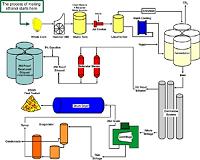 |
New York NY (SPX) Jan 21, 2011 China could lead the race to roll out electric vehicles and will deploy new transport technologies at scale more quickly than the United States, according to a report by Accenture that compares the two countries. But the US could lead a global biotechnology-based agricultural revolution that will generate a greater range of biofuel breakthroughs. The report, "The US and China: the race to disruptive transport technologies", concludes that China's state-backed focus on electric vehicles (EVs), its domestic supplies of lithium and current battery production capability will give it a competitive advantage over the US in EVs. The US' market led-approach will result in a more gradual development of new technologies. However, it will be better placed to create new innovations across many platforms (advanced combustion engines, electric and advanced biofuels) that can be integrated into the existing fuel supply infrastructure. The rise of new fuel technologies and greater fuel efficiency will give both countries greater energy independence. The reduction in gasoline demand in the US could be up to 22 billion gallons per year by 2030 if vehicle miles travelled (VMT) remained roughly the same as today, according to an Accenture scenario analysis. This could cut crude oil imports by 1 billion barrels per year, a 34 percent reduction from the 3.3 billion barrels imported in 2009. China, which imports over half its petroleum demand, could reduce its crude oil imports by 676 million barrels per year by 2020, a drop of 21 percent from today.
Hydrocarbon Winners and Losers The reduction in gasoline demand will impact US refineries currently configured to maximize gasoline production and favor those refineries that can more easily adjust their product mix. But in China there will be no losers. Even though China intends for alternative energy to make up 30 percent of transport fuels by 2020, Accenture estimates that car ownership will almost triple between now and 2020 to approximately 200 million, creating growth for the biofuel, EV and oil industries. "The US already has a competitive advantage in agriculture and conditions that make it the home of completely new technologies, but China's policy decisiveness will allow it to scale specific new transport technologies more rapidly," said Melissa Stark, global lead of the Clean Energy Practice at Accenture. "However, these respective strengths will not guarantee long term competitiveness and policy makers and investors in both countries will need to put in place major structural changes to ensure their industries adapt and can compete globally."
Implications for US competitiveness This structural change in fuel demand will favor larger, more complex refineries with lower marginal costs and production flexibility to make different product slates including "fuel switching" or the ability to incrementally increase diesel production (or gasoline) if demand dictates. Disparate federal funding will disadvantage the US. Although the government has committed billions, the support is spread across many technologies, versus approximately $15 billion the Chinese Government has committed to EV deployment for the next 10 years. The US EV industry faces strong competition from China, Japan and Korea which already account for 60 percent of the US's rechargeable battery imports. The US will depend almost entirely on lithium imports from Asia and Latin America (China supplies a fifth of the world's batteries and its reserves of lithium can support 450 million vehicles).
Implications for China's competitiveness China's investment and policy-driven approach will need to be supplemented by more consumer oriented business models and innovation that build on a greater understanding of consumer demand. China must supplement its advantages in rapid implementation with greater investment in core technology innovation. More transparent IP processes, talent strategy and incentive policies are required to attract funding of new fuel industries. "The US has to manage the transition of its legacy infrastructure to one that will accommodate new fuels to ensure that this transition occurs at the lowest possible investment cost," said Melissa Stark. "The US does not have a blank piece of paper while China, in many ways, does. China's challenge is to balance implementation with innovation if it is to compete well in the long term race for new transport technologies. Both countries need to leverage their respective advantages."
Implications for the oil and electricity supply sectors As China's oil companies expand globally, they will need to improve their merger and acquisition strategies and post merger implementation. Accenture also recommends that electricity utilities proactively manage the opportunities and challenges presented by electrification of transport. Given uncertain consumer demand, utilities will have to improve their understanding of consumer preferences for EVs to mitigate the high risks associated with infrastructure investments. Electricity distributors should also increase low voltage energy storage investments to mitigate the volatile demand of EV charging and the intermittent supply of renewable energy. Proactive management on this level will further position utilities to capture market opportunities related to electrification of transport.
Share This Article With Planet Earth
Related Links Accenture Bio Fuel Technology and Application News
 Celanese Signs LoI For Ethanol Production Facilities In China
Celanese Signs LoI For Ethanol Production Facilities In ChinaZhuhai, China (SPX) Jan 21, 2011 Celanese has announced that its wholly owned subsidiary, Celanese Far East Limited, has signed letters of intent to construct and operate industrial ethanol production facilities in Nanjing, China, at the Nanjing Chemical Industrial Park and in Zhuhai, China, at the Gaolan Port Economic Zone. Pending project approvals, Celanese could begin industrial ethanol production within the next 30 m ... read more |
|
| The content herein, unless otherwise known to be public domain, are Copyright 1995-2010 - SpaceDaily. AFP and UPI Wire Stories are copyright Agence France-Presse and United Press International. ESA Portal Reports are copyright European Space Agency. All NASA sourced material is public domain. Additional copyrights may apply in whole or part to other bona fide parties. Advertising does not imply endorsement,agreement or approval of any opinions, statements or information provided by SpaceDaily on any Web page published or hosted by SpaceDaily. Privacy Statement |